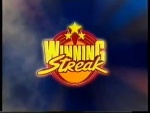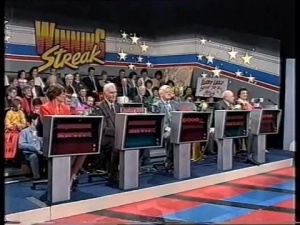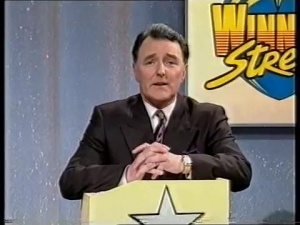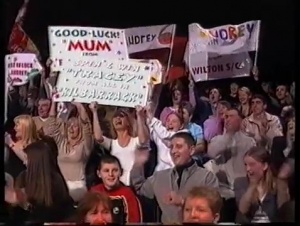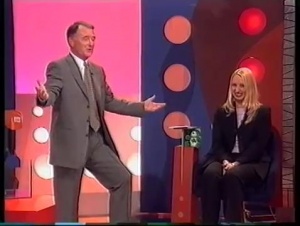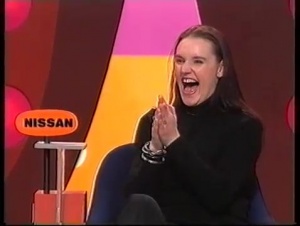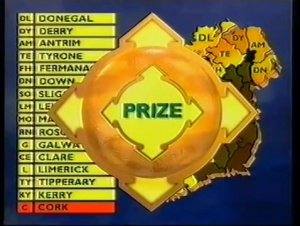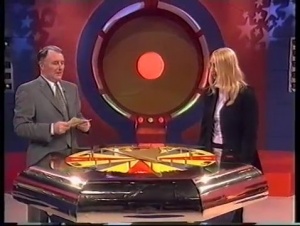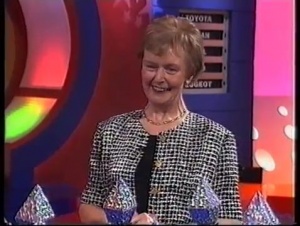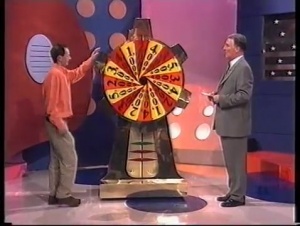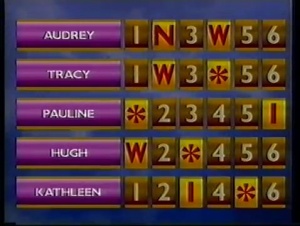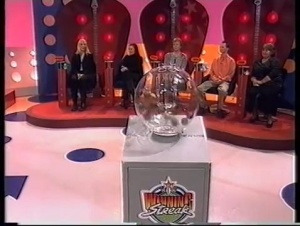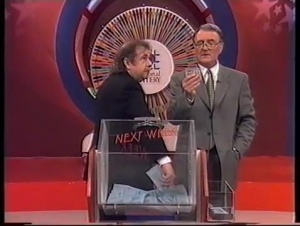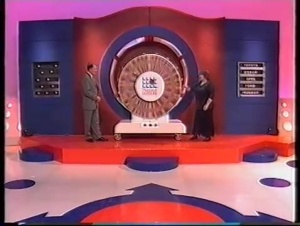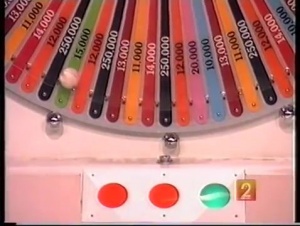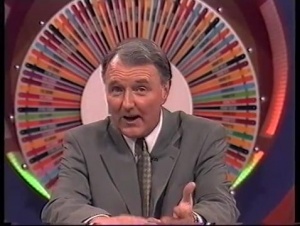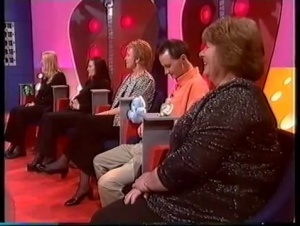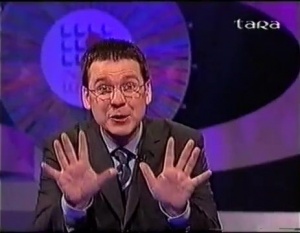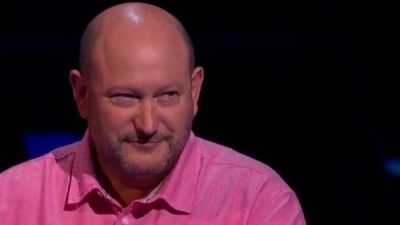Weaver's Week 2020-09-13
Last week | Weaver's Week Index | Next week
Strange days for Ireland, as Winning Streak has come to a grinding halt. The lottery tie-in show has been running for almost thirty years, but had to stop production in March because of general health concerns. These concerns are still present, and everyone's decided to pause the scratchcard game – and the television show – for the foreseeable future.
This is a shame. It's not going to stop us from tootling the trumpet, and paying tribute to one of the longest running game shows in the world.
Contents |
Winning Streak
RTÉ in association with The National Lottery for RTÉ1, from 21 September 1990
The concept behind Winning Streak is simple. You buy a scratchcard. You find it's got three stars on it. You send it in, and it gets pulled out of a big tombola thing. One week later, you're at the glitzy and glamorous RTÉ studios meeting your heroes and winning a lot of cash.
The reality was slightly different. Scratchcard, yes. Stars, yes. Big tombola thing, yes. Lots of people wanted to appear on this show, and they only needed five players a week. And if you didn't want to appear yourself, you could send someone else in your place. But the glitzy and glamorous RTÉ studios? Not likely! In the early 1990s, RTÉ housed Winning Streak in the smallest studio they could find. So small that even Ó Malley, the resident RTÉ cat, wouldn't use it to drink coffee; nowhere to put his purr-culator.
Nevertheless, RTÉ put Mike Murphy and a braying crowd of people in the shoebox. Mike Murphy was RTÉ's biggest light entertainment star, he'd hosted talk show The Live Mike and travelogue Murphy's America, and commentated on many RTÉ entries at the Eurovision Song Contest. Viewed from thirty years later, he's relatively formal, but this is the early 1990s and it's a live show and he's got to get off air on time otherwise they'll lose ad breaks.
There aren't many examples of Winning Streak from the 90s up on the internet, sadly. We'll take a sample episode from 15 January 2000. It's the second since the Christmas pause. Last week, they gave away a car to a home viewer, and they've brought the winner into the studio. As is traditional, the crowd has brought signs cheering for their favourite contestant.
Mike spends an absolute age talking to the contestants. Many of the questions are poor ones, they can be answered with a simple "Yes" or "No". Des O'Connor ran Take Your Pick like this, but he wanted people to fail. Mike knows that each contestant has been primed to tell one anecdote, but Mike's interviewing style blocks them from telling their tale. He also tends to the elliptical...
"So you're 21?" "Yes"
"Living with your parents?" "Yes"
"Single?" "Yes"
"Why no boyfriend?" "Haven't met the right one."
"How's the Dun Laoghaire bypass?"
Mike Murphy appears to think he's the star of the show, that people tune in for his sparkling repartee, wit, and travel advice to steer clear of the Red Cow roundabout. The lottery might want to think the stars are the contestants, normal human beings given their forty-five minutes of fame. The viewers are, perhaps, most interested in the prizes, especially the ones they might get their hands on next week. This ordeal by question drags on, almost a quarter of an hour introducing the players, Hear their stories, say hello to all their friends, individually, by name.
Eventually, at last, Mike gets on with the prizes. For the first game, he invites the players to pick a car. Any car. Any of these five makes of car. In the side of the studio, there's a safe deposit box, where the makes of car have been randomly placed. If you the player have matched the make of car picked out at random for you, then you've won it – either the car or the cash.
Yep, they could give away five cars on the show, and if they manage to get no matches, then they'll pick someone out of the tombola to win the last car hidden. How do you get in the tombola? You send in a winning Winning Streak lottery scratch card game, it'll qualify you for all sorts of draws – and potentially to appear on the show.
Treasure Ireland is next, our players are presented with half of the thirty-two counties on the island to pick from. Our player takes a prize – a weekend in Dingle. Nice.
And then our player picks a compass. A what? A compass, spin of the wheel. Sixteen segments, half of them give cash from £5000 to £15,000, five win another car, and three give extra picks for the end game.
A compass or a cash amount ends the turn, but a player who picks a prize gets a second go. This comes as a surprise to the host, who doesn't understand the rules of his own show.
Another player picks the "Diamond Dilemma"; eight diamonds contain cash amounts from £5000 to £20,000. But the player doesn't have to open the diamond, they could take a surefire £10,000. It's a short game of Deal or No Deal with a banker who has clocked off for the weekend and sent a single offer to cover all eventualities.
There's also a "gold mine", which we don't see on this episode (but we do come to next week). Someone is going to play "Spin the Wheel". Two spins of a wheel between £1000 and £5000, higher total is the one our player will keep, and a double pays double. If no-one picks it, the player in last place spins the wheel.
After the commercial break (it's 2000, they take a single break in a 40-minute show), we draw out five players for next week. George from The Furey Brothers is the celebrity guest, picking out the lucky names.
So far, each of our players has been on their own. For the final game, the players go up against each other in a simple recreation of the Monkhouse Master Card from Bob's Full House. Here are six spaces. Three of them contain letters spelling out "WIN". Three of them do not. Your task: find the letters to spell "WIN".
Each player gets two free goes, more if they won on the Compass, and then they start "the bubble". It's one of those plastic globes with balls inside, like they would briefly show on In It to Win It. Here, the balls are numbered for each player, and one is picked out. It's a totally random process, demonstrably so. Whoever's number comes out gets to choose the next space, hoping to find a letter and complete the word. It's a tense game, and certain to end sooner rather than later.
But what happens when you complete the word? You win, of course. The clue is right there on screen: when you spell "WIN", you win. This isn't hyperdimensional ultra-chess, where the only way to win is to capture your opponent's rook before starting the game. This isn't global thermonuclear war, where the only winning move is not to play. This isn't as intellectually taxing as Only Connect or Wheel of Fortune. This is Winning Streak, a show based on pure luck, where the lure of the big prize is the star.
At the end of the game, our players have amassed small fortunes. A typical contestant is going home with £10,000, which is roughly one year's disposable income for the average person. And that's one of the great keys to the success of Winning Streak – it offered an amount that was big, but not life changing.
Psychologically, we can get our head around one year's disposable income – £10,000 in 1999, €20 000 for most of the 2010s. It's a tidy sum, we can all think of many things to do with it, but there's no way we're going to give up our job and retire on it. And five people just like you have popped onto national television and won just that much. It was them, it could be you. It won't be you next week, but it could be in a future week... if you buy the scratchcard.
Compare and contrast with Camelot, who operate the lottery this side of the water. They're obsessed with giving away million pound jackpots, a handful of people get obscenely rich while the rest of us get absolutely nothing.
Compare and contrast with the game shows wrapped around Camelot's products, especially Winning Lines and One Versus One Hundred. If they're clever enough, one person is going to get the holiday of a lifetime, or a stonking cash wodge. And, before they even leave the studio, they'll meet between 48 and 100 other people who have won diddly-squatt. To the winners, everything: to the masses, nothing.
Back on Winning Streak, we've had to wonder what the winner has won. They've won the chance to spin a wheel. It's a wheel containing a fortune, literally. The jackpot's £250,000, and the smallest possible win is £10,000. Three complete spins to make sure the player can't influence where the ball lands, and wait a moment to be sure the ball's stopped. And that's the show, it ends with someone winning a lot of money every single time.
The streak goes on
Winning Streak became part of the cycle of the year. Because the programme is seasonal – running from September to May – the scratchcards came off sale around Easter. And, in a blaze of publicity one quiet August day, the new scratchcard was launched with a glitzy and glamorous star – medal-winning athlete Michelle Smith one year, chefs Paul and Jamie Rankin another. The common thread: people who are on a winning streak of their own, and in the public eye.
Mike Murphy left The Arts Show on Radio 1 in 2000, and stepped down from Winning Streak the following year. His final editions went out during the foot-and-mouth crisis of 2001, during which long-distance travel on Ireland was firmly discouraged. Filming Winning Streak was not essential, and proxy celebrities stepped in to represent the players.
Unfortunately, someone stood on Ó Malley's tail when they were discussing the plan, and the celebrity booker misheard. The result was a load of poxy celebrities, whoever could be lured out of the RTÉ canteen with the promise of a nice slice of tea. You too could be insulted by Dr Alan Bumptious from Good Afternoon! There was also a stunt audience, the usual friends and family were replaced by a party from a local old folk's home. Should have nipped down the grams library for some Canned Crowd.
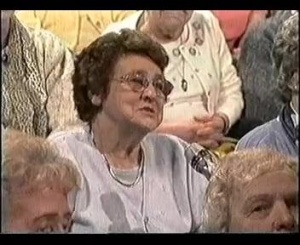 "I thought we were watching Countdown with that nice Richard Whiteley."
"I thought we were watching Countdown with that nice Richard Whiteley."
Throughout its first eleven years, Winning Streak had been a problematic fave. Sure, it pulled in the audiences, it's one of the biggest shows on television. It did its job to promote the National Lottery game, and we can be sure they'll spend money in your neighbourhood. But the show had always been a little bit smug, ever so slightly patronising of its players.
There's a slight, subtle problem with the tone, almost entirely covered by the show's glitz and glamour. Mike Murphy was well-educated, well-read, slick, quick-witted. Comparisons to Bob Monkhouse would be fair to both men. But while he could talk with the people, Mike Murphy rarely came across as being of the people. Winning Streak is the most democratic programme possible, contestants are literally chosen by the fickle finger of fate. Mike sometimes came across as the squire of the manor, a cut above all this grubby nonsense.
And it showed on screen. The disjointed chat with the players, as though he's not listening to what they have to say – or he doesn't care what they have to say. All of the games on the show are random chance, and there are boring legal reasons why Mike has to say they're random chance, but he often came across as condescending to the players. These players represent us, the great Irish public. When Mike allows us to think that he thinks the players are thick, then we think that Mike thinks we're thick, and that's pretty damned offensive.
While other shows had moved with the times, Winning Streak hadn't. January 2000 was a world of moody lighting and dark music, of Chris Tarrant on the other side giving away a million quid sterling. Winning Streak still had a bright studio and the same games as always. It felt cheap, and the presenter didn't help.
A new season brings a new scratchcard, and the National Lottery had decided to make some more significant changes to Winning Streak for the 2001-2 game. Serendipity hit the television show. Mike Murphy had to take a leave of absence while he recovered from a back operation. He wouldn't return to the programme. He was replaced by Derek Mooney.
The effect was instant. It's like hearing Father Ted Crilly can't take Sunday Mass any more, and seeing his replacement is Father Dougal Maguire. Where Mike was knowing and erudite, Derek was naïve and eager, a boundless and innocent enthusiasm. Winning Streak needs a boundless and innocent enthusiasm, because it's the stuff you can turn into dreams.
Next week, we'll look further at Winning Streak under Father Dougal — er, er, Derek — and his successors.
All figures in this piece are in Irish Pounds, typically worth about £0.90 Pounds Sterling on the other side of the channel, and later worth a fraction less than €1.27.
Thanks to The Overnight Guy for assistance with this week's feature.
In other news...
As we suggested last time, The Strictly Come Dancing Klaxon, has been going off absolutely everywhere. Here are the stars of the new series:
- Caroline Quentin, a comedy actor from London
- Jason Bell, a former American NFLball player from Salford
- Max George, from boy band The Wanted
- Ranvir Singh, from ITV's Good Morning Viewers
- Clara Amfo, a Radio 1 presenter
- Nicola Adams, a retired boxer
- Bill Bailey, a comedian and birdwatcher
- JJ Chalmers, a television presenter
- Maisie Smith, Tiffany Butcher in The Eastenders
- Jamie Laing, from E4's Made in Chelsea
- Jacqui Smith, a customer of dodgy films
- Hrvy, a singer and CBBC irregular
Live performances are scheduled from 24 October, with the final on 19 December.
Another entertainment series for BBC1: Richard Osman's House of Games Night, a cross between his successful House of Games and the Celebrity Game Night they tried on Channel 5 a few years ago. All of your favourite games will be there, and Rhyme Time, and Answer Smash, but they'll be joined by The House of Games House Band, and some special guests in Richard Osman's Guest House of Games.
A change to Richard's day job, as there's a new round on Pointless. Before the head-to-head, the couples take dibs at a board containing six possible answers to a question. Two are wrong, two are right but score a few points, and two are Pointless answers. Each Pointless answer here – just like in the main game – adds £250 to the jackpot. Feels like a gentle excuse to up the prize budget, perhaps to the giddy heights of £1500 per show.
Remember the virtual reality headsets they had at Junior Eurovision a couple of years ago? Turns out to have been a foretaste of how the 2020 contest will be held. All 13 competing broadcasters will pre-record their entries in their own virtual studio, then TVP will stitch the performances together, wrap around some presenters, and show them to Europe's watching millions. It's not the contest we would prefer, but there's no arguing with nature, and the show will go on. 29 November at 17h CET (4pm in London).
Best of the web: Andrew Pixley writes about television game shows on the television. It's not just Telly Addicts...
Nominations are out for the BAFTA Cymru awards, the best shows made in Wales. Project Z (Boom Kids for CITV) is the one game show up for an award, in the Children's Programme category. Winners to be announced by Alex Jones on 25 October.
Reports that Never Mind the Buzzcocks is coming back – but on pay television. Comcast's The Satellite Channel has been linked with the pop music panel game, which ran on BBC2 from 1996 until 2015. These reports only have a single source, and we're always wary about reports with a single source.
Confirmed news from ITV: new captains for Celebrity Juice. Laura Whitmore and Emily Atack will be the regulars in the new series of ITV2's other successful show, alongside host Keith Lemon. No word yet on the Killer Camp revival.
Confirmed news from the BBC: Gordon Ramsay to host Bank Balance. The shouty cook will host the primetime studio quiz programme, made by the independent contractor Studio Ramsay. Curious, that.
Coming this week, Yung Filly's Celeb Lock-In (BBC1, Mon) may or may not pass as a game show. Dating-at-home show Five Guys a Week is back (C4, Fri). It's always Movies Week on Strictly Come Dancing, as demonstrated by a clips show (BBC1, Sat). A choice of celebrity quizzing next Saturday: Andy Crane does The Chase, Jeff Stelling from Alphabetical is on Catchphrase, while Pointless Celebrities features "Diddy" David Hamilton, a Teletubby, and a Cheesy Wotsit.
And that's all the game show news there is.
What, someone's won the top prize on Who Wants to be a Millionaire? Well done, Donald Fear, the latest person to leave the studio with a hugemungous cheque.
Photo credits: RTÉ / National Lottery, EBU / BTRC, CPT Holdings Inc / Stellify Media.

